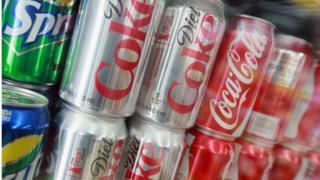 Image copyright
Getty Images
Image copyright
Getty Images
The chances of an interest rate rise later this year have receded after Consumer Price Inflation fell to 2.4% in April - its lowest level since March 2017.
The fall from 2.5% in March was partly blamed on the timing of Easter, which meant a seasonal rise in air fares was not included in April this year.
The figures did show the effect of the sugar tax on soft drinks and juices.
Analysts say there may not be a rate rise in 2018 as a result.
"Inflation falling for the third month in a row further dents any hopes of a late-summer rate rise from the Bank of England," said Ben Brettell, senior economist at Hargreaves Lansdown.
"The Bank's currently thought likely to put rates up in August, but I think we might not see a rate rise for the rest of the year," he said.
Mike Hardie, head of inflation at the Office for National Statistics (ONS). said: "Inflation continued to slow in April, with air fares making the biggest downward contribution, due to the timing of Easter. This was partially offset by the rise in petrol prices."
Petrol prices are at the highest level for three-and-a-half years.
The average price of petrol has risen to 127.22p a litre and diesel to 129.96p following a rapid rise in the cost of oil.
That means the fall inflation could be short-lived, according to analysts.
"The recent weakness in the pound and the rising oil price are a concern and could quickly reverse the drop in inflation," said Kevin Doran, chief investment officer at AJ Bell.
He also warned that a fall in the value of the pound could drive up costs of imported goods for shoppers and businesses.
Analysis: Andy Verity, BBC economics correspondent
Inflation keeps on coming in lower than expected. If you strip out volatile items like food and fuel, then so-called "core inflation", Bank of England governor Mark Carney's preferred measure, is only 2.1% - barely above target.
From being 90% sure a couple of months ago that a second interest rate rise would have happened by now, the markets now think it's unlikely before November.
Why raise rates even then? The thinking now is - inflationary pressures may have abated for now, but the BoE has to look two years ahead.
At the last count (first three months of the year) the average pay rise was 2.9% and it may go higher.
The pound has weakened against the dollar recently and if higher oil prices, priced in dollars, are here to stay, they are likely to push up the cost of imported goods.
The Bank isn't at all sure the threat from above-target inflation has gone for good.
The pound fell by around half a cent against the dollar after the inflation figures were released. It then recovered to trade at $1.3368.
In April, the pound climbed as high as $1.4325 on expectations that UK interest rates would soon be moving higher.
However, since then, weaker economic data has reversed that thinking and the pound has fallen almost 7% from that April high.
Inflation on the Retail Prices Index (RPI) measure rose to 3.4%, from 3.3% in March.